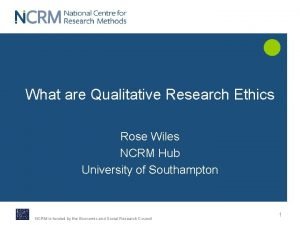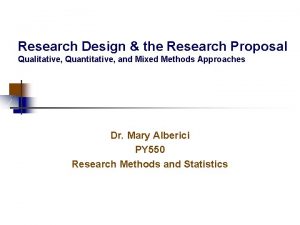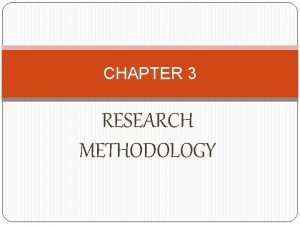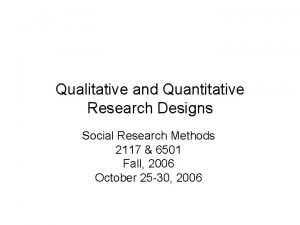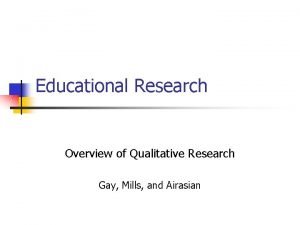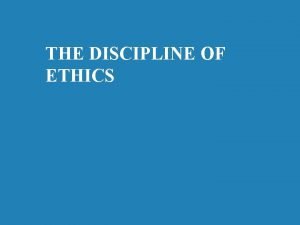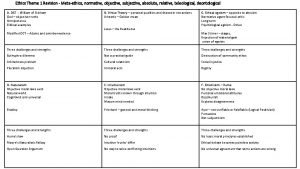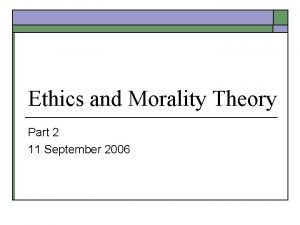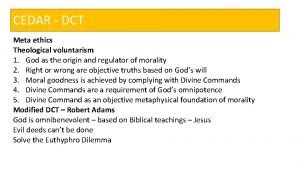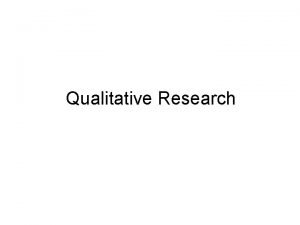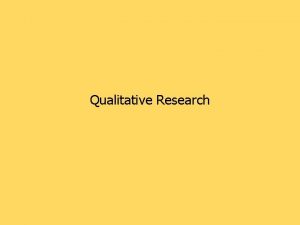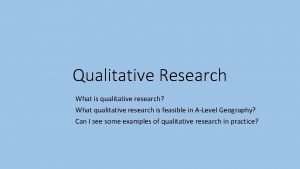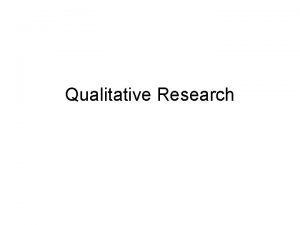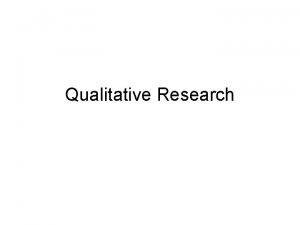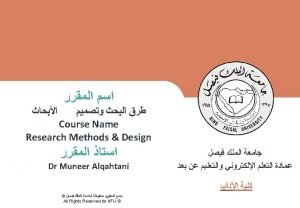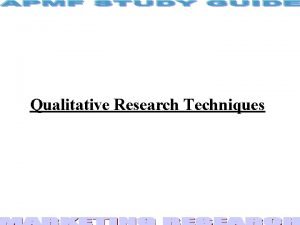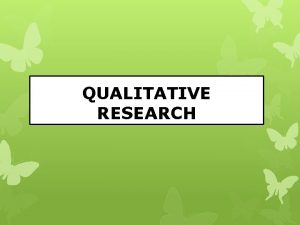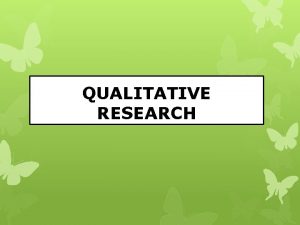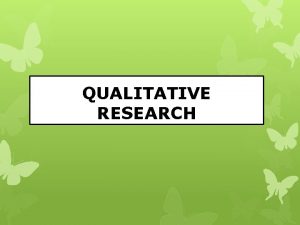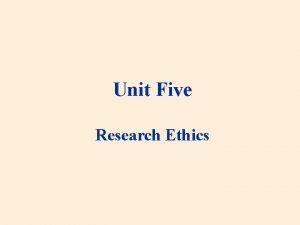What are Qualitative Research Ethics Rose Wiles NCRM


















- Slides: 18

What are Qualitative Research Ethics Rose Wiles NCRM Hub University of Southampton NCRM is funded by the Economic and Social Research Council 1

Outline of Presentation • What do we mean by ethics? • Outline ethical frameworks for helping consideration of ethical dilemmas – Principlism – Consequentialism – Ethics of care – Virtue ethics • Example …. . NCRM is funded by the Economic and Social Research Council 2

What are Ethics? NCRM is funded by the Economic and Social Research Council 3

An ethical dilemma In a study in an educational context exploring school-based friendships and using participatory and child-friendly research methods, the process for consent for children to participate in the study was that consent was needed from both the child and his/her parents. On the day the research was to take place, one child gave in her consent form on which the parent’s signature had clearly been forged. The child denied they had forged it, and was desperate to take part in the research project and expressed anxiety about feeling excluded if she was unable to participate. Should the researcher overlook the forged consent given the research does not pose any risks to the child and indeed excluding them might be judged as more harmful? NCRM is funded by the Economic and Social Research Council 4

Factors Shaping Ethical Decision. Making NCRM is funded by the Economic and Social Research Council 5

Principlist Approaches • The framework used most commonly • Based on 4 principles – Respect for autonomy; informed consent, voluntariness, confidentiality, anonymity – Beneficence, ‘do good’ – Non-maleficence, ‘do no harm’ – Justice, distribute the burdens and benefits of research equally • A starting point for explore ethical dilemmas NCRM is funded by the Economic and Social Research Council 6

Consequentionalist Approaches • Ethical decisions based on consequences (outcomes) of actions rather than principles • Actions are morally right if they produce a good outcome for an individual – or more usually wider society • Covert research? • Breaching confidentiality? NCRM is funded by the Economic and Social Research Council 7

Ethics of Care • Ethical decisions made on the basis of care, compassion • 3 points central – Situational rather than universal principles – Stresses care and compassion for research participants – Stresses interdependency/ relationality between researchers and all people affected by research NCRM is funded by the Economic and Social Research Council 8

Virtue Ethics • Person based • Focus on a researcher’s moral character • Notion of research integrity • Virtues needed to behave in morally in research NCRM is funded by the Economic and Social Research Council 9

The Virtues and Vices of Research Phase Defect (vice) Virtue Excess (vice) framing cowardice courage recklessness Negotiating manipulativeness respectfulness partiality Generating laziness resoluteness inflexibility Creating concealment sincerity exaggeration Disseminating boastfulness humility timidity Reflecting dogmatism reflexivity indecisiveness Macfarlane. B. (2009) Researching with Integrity. Oxon: Routledge

Making Ethical Decisions • • identify the nature of the problem and the stakeholders involved; identify various options for resolving the dilemmas; identify the range of consequences of each option for different stakeholders; consider the short and long-term implications of decisions; consider the options by reference to moral principles such as honesty, trust, autonomy, fairness and equality; integrate consequences and principles to reach an independent and justifiable decision; reflect on the decision Israel, M. & Hay, I. (2006) Research Ethics for Social Scientists. London: Sage NCRM is funded by the Economic and Social Research Council 11

An ethical dilemma: consent While Dan verbally agreed to all the data we have from his participation in our research being archived in our previous wave of interviews back in 2007, we have been providing our participants with more detailed information about archiving and asking them to sign consent to archiving forms in this year’s round. Unfortunately Dan died just before he was about to participate in the 2009 wave, and so he has not signed the form. The question here is can we go ahead and archive the data anyway on the basis of his verbal consent two years ago? An alternative is that we ask Dan’s parents if they would sign the archiving consent form, as his next of kin. This, however, implies or suggests that they have some sort of ownership of the data. Could Dan’s parents demand their own copies of Dan’s data? Could they refuse to give permission to archive the data, despite Dan’s implied consent two years previously? http: //www. timescapes. leeds. ac. uk/research-projects/siblings-friends NCRM is funded by the Economic and Social Research Council 12

An ethical Dilemma: confidentiality But perhaps there is also a moral dimension to the issue of the data and Dan’s parents too. We both have a sense that we hold something material of Dan, while his parents and siblings have lost their son and brother. We have, for example, recordings of his voice. We are wondering whether we should offer to give Dan’s parents in particular a sample of his voice identifying a non-sensitive part of the 2007 interview, such as Dan’s discussion of his interests. There are several issues that we are thinking about in this respect. We did promise Dan confidentiality and anonymity when we collected the data from him, though of course we and he did not have such a situation in mind. Does that promise over-ride this situation? If the confidentiality promise doesn’t over-ride giving Dan’s parents a sample of his voice, who are we to decide that they should not hear anything we consider sensitive? NCRM is funded by the Economic and Social Research Council 13

Responses - consent ‘My instinct is that you ought to contact Dan’s next of kin … given that he was only 16 when he consented. It may be that you need to remind them that you have the data and offer them a chance to consent to archive or request that Dan’s data is withdrawn and destroyed’ ‘I feel it is not their decision to refuse whether Dan’s data can be archived as this was an agreement which you entered into with Dan – not his parents ‘ NCRM is funded by the Economic and Social Research Council 14

Responses - confidentiality ‘I think considering offering his parents a sample of his voice would be to consider their feelings in the circumstances, rather than necessarily infringing Dan’s privacy’ ‘I think that his agreement to anonymity and confidentiality still stands, he hasn’t revoked it – and – honestly, ethically, I am not sure you can speculate on what he may or may not have wanted and how that may or may not have changed over time or with circumstances’ NCRM is funded by the Economic and Social Research Council 15

Decision We came to the conclusion that there was no, one, solution to the ethical dilemmas, and we would do what felt comfortable for us. Other researchers may have settled on other courses of action in the same situation, but we decided to do the following because it feels morally caring to us. We have followed up our condolences card by writing to Dan’s parents after Christmas and New Year was over, on the assumption that this period would be particularly difficult for them. We offered them and/or Dan’s siblings the opportunity to archive any memories of Dan alongside his research data if they wanted to (this offer was in effect informing them that the material was being archived). We also offered them a sample of Dan’s voice. We left it that if they did not contact us we would understand that they would prefer not to be involved in these ways. Dan’s parents responded to say that they would like a DVD of extracts from his interview, and also to have their memories of Dan recorded for the archive. NCRM is funded by the Economic and Social Research Council 16

Summary Conclusions • Gut feelings versus ethical frameworks; ethical frameworks help researchers to think about, evaluate and justify ‘gut feelings’. • Which framework? Researchers need to use frameworks that fit with their moral views and which enable them to explore and justify their decisions. • There are no answers! Ethical frameworks provide a means of thinking about ethical dilemmas and assessing what an appropriate and defensible course of action might be. • Individual researchers make different decisions NCRM is funded by the Economic and Social Research Council 17

NCRM is funded by the Economic and Social Research Council 18
 Rose wiles
Rose wiles Insidan region jh
Insidan region jh Maurice wiles miracles
Maurice wiles miracles Wiles elementary
Wiles elementary Keith wiles
Keith wiles Martin wiles
Martin wiles Louise wiles
Louise wiles Appendices research example
Appendices research example Components of a research methodology
Components of a research methodology Quantitative vs qualitative experiment
Quantitative vs qualitative experiment Importance of qualitative research
Importance of qualitative research What is environmental ethics
What is environmental ethics Briefly recap
Briefly recap Macroethics definition
Macroethics definition 6075 meaning
6075 meaning Methaethics
Methaethics Descriptive ethics vs normative ethics
Descriptive ethics vs normative ethics Descriptive ethics vs normative ethics
Descriptive ethics vs normative ethics Theological voluntarism
Theological voluntarism
